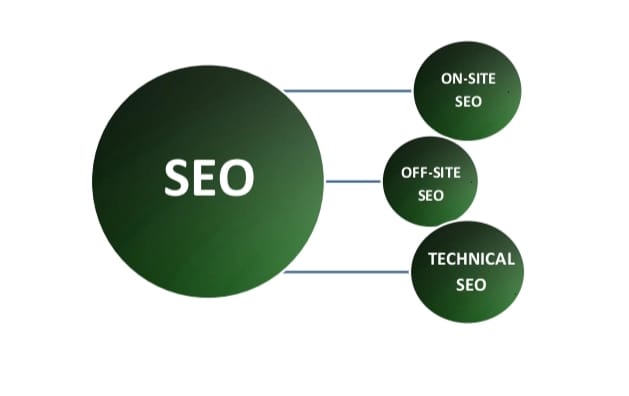(On-Site SEO, Off-Site SEO & Technical SEO)
Types of SEO
1. On-site SEO: Improving the visibility of your website in search engine results by optimizing its content, structure, and technical elements.
2. Off-Site SEO: Creating external signals such as backlinks and social media mentions to increase the authority and trustworthiness of your website in the eyes of search engines.
3. Technical SEO: Technical SEO is concerned with the technical aspects of your website, such as site speed, mobile friendliness, and structured data, in order to ensure that search engines can easily crawl and index it.

On-site SEO:
On-site SEO (Search Engine Optimization): On-site SEO refers to optimization techniques that are applied directly to your website’s individual pages and content in order to improve their search engine rankings. This includes several components, including:
- Keyword optimization:- This is the process of carefully selecting and strategically placing relevant keywords within your content, titles, headers, and meta descriptions to match what users are searching for.
- Quality Content:- Creating high-quality, informative, and engaging content that not only satisfies user intent but also encourages users to spend more time on your site
- Meta Tags:- Creating compelling meta titles and descriptions for each page that provide concise and appealing summaries in search engine results
- Image Optimization:- Improving page load speed and accessibility by optimizing images with descriptive filenames, alt text, and suitable sizes
- Internal Linking:- Developing a logical and user-friendly internal linking structure to effectively guide visitors through the pages of your website and forward link authority.
- Mobile-Friendliness:- As Google encourages mobile-first indexing, make sure your website is responsive and mobile-friendly. Page Speed: Enhancing the user experience by compressing images, leveraging browser caching, and minimizing code.
- User Experience (UX):- The design of your website for ease of navigation, readability, and user satisfaction, which influences search engine rankings indirectly.
URL structure is the process of creating clean, user-friendly URLs that include relevant keywords and describe the page’s content.
Off-site SEO:
- Link Building:- quality, authoritative backlinks from other reputable websites to demonstrate the trustworthiness and value of your website. Backlinks, both natural and earned, are extremely valuable.
- Social Media Marketing:- Using social media platforms to actively share content, connect with your audience, and promote your website Social signals can have an indirect effect on search engine rankings.
- Online Reputation Management:- Monitoring and managing your brand’s online presence and reputation through reviews, ratings, and responses to customer feedback is what online reputation management is all about.
- Guest Blogging:- Guest blogging entails writing informative and relevant articles for other websites in your industry or niche, with a backlink to your site. This aids in the establishment of authority and the development of relationships.
- Influencer Marketing:- Collaborate with influencers or industry experts to promote your content or products, leveraging their reach and credibility.
- Content Marketing:- Content marketing is the process of creating useful, shareable, and linkable content that naturally attracts backlinks and social shares from other websites.
- Local SEO:- Local SEO is the process of optimizing your online presence for local search by maintaining consistent NAP (name, address, and phone number) information, managing local listings, and soliciting reviews on platforms such as Google My Business.
- Online PR:- Online PR is the process of establishing relationships with online publications and journalists in order to obtain media coverage and mentions, which can lead to valuable backlinks and brand exposure.
- Community Engagement:- Participating in relevant forums and online communities where your target audience congregates, establishing your expertise, and subtly promoting your website
- Competitor Analysis:- Analysis of your competitors’ off-site SEO strategies in order to identify opportunities and gaps in your own strategy.
Off-site SEO improves your website’s search engine rankings by demonstrating its authority and relevance to search engines like Google. It’s a continuous effort that works in tandem with on-site SEO to create a well-rounded SEO strategy.
Technical SEO:
Technical marketing is a specialized field that focuses on promoting and selling technical products or services. Here are some key points to understand about technical marketing:
- Product Knowledge: Technical marketers must have a thorough understanding of the product or service they are promoting. This includes its features, benefits, and operation.
- The target audience: The target audience must be identified and understood. Technical marketers must understand who will benefit from the product and tailor their marketing efforts accordingly.
- Content Creation: Creating technical content is an important aspect of this role. This can include technical documents, whitepapers, blog posts, videos, and other media.
- Competitive Analysis: Understanding the competition is essential. Technical marketers must be aware of competing products and services, as well as how their offerings compare.
- Market research: Market research is critical for successful technical marketing because it keeps you up to date on industry trends, customer needs, and emerging technologies.
- Communication skill: Technical marketers must be able to communicate complex technical information in a clear and concise manner. Both written and verbal communication are included.
- Digital Marketing: In technical marketing, it is common to use digital channels such as websites, social media, and email campaigns to reach a tech-savvy audience.
- Technical Knowledge: Having a technical background or at least a strong understanding of the product’s technical aspects can be extremely beneficial.
- Lead Generation: A critical aspect of the job is generating leads through various marketing channels and nurturing them through the sales funnel.
- Sales Support: Technical marketers frequently collaborate with the sales team to provide them with the materials and information they need to effectively close deals.
- Measurement and Analytics: Data and analytics are used to measure the effectiveness of marketing campaigns and make data-driven decisions for improvement.
- Adaptability: Because the technology industry is constantly changing, technical marketers must be adaptable and eager to learn new technologies and strategies.
To summarize, technical marketing is a specialized field that combines technical knowledge with marketing skills in order to effectively promote and sell technical products or services. To drive sales and business growth, it is necessary to have a thorough understanding of the product, the target audience, and the ability to clearly communicate technical information.
